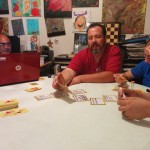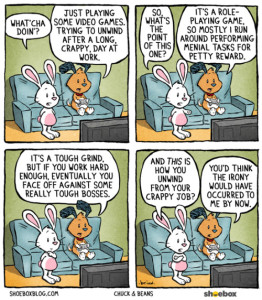
As a gamer who is a fan of stories and storytelling, I tend to be drawn towards games that allow and encourage the telling of stories. This is why I became a fan of roleplaying games; they are the single best framework for telling stories as a game. Of all the RPGs I’ve tried (and I have tried many), my favourite is, without question, Changeling: the Dreaming. It emphasises creativity, and is set in a world which includes a vast realm made entirely of dreams. This allows you to play in any setting you can imagine. The important thing right now is that the characters in this story are faeries inhabiting human bodies. Normally, players assume that the human body in which a fae spirit is housed matches the demographics of the fae spirit itself. But as I find myself thinking more about Changeling as a result of the recent 20th Anniversary Kickstarter, I realise that nowhere in the rules does it say that this is necessarily the case. In fact, there are places where it hints that it isn’t always the case; specifically, it mentions that the Eshu, an African kith, are not always born into host bodies of African descent. Thus, I begin to wonder if there are other ways in which this disconnect can be expanded. And my first thought is: what if the human body is of a different gender than the fae spirit born into it? And thus I find myself contemplating the possibility of Transgender Changeling.

 I was introduced to
I was introduced to  When people sit down to play games, what exactly are they doing? I spoke of this a bit
When people sit down to play games, what exactly are they doing? I spoke of this a bit  Why do we play games? Sure, we all have our reasons. For some, it’s about spending time with people they love. Other people see it as an exercise in creativity, or practising various mental skills (or, let’s be honest, physical skills; not all games are played around a table or in front of a television set).
Why do we play games? Sure, we all have our reasons. For some, it’s about spending time with people they love. Other people see it as an exercise in creativity, or practising various mental skills (or, let’s be honest, physical skills; not all games are played around a table or in front of a television set). Robin Laws, an experienced author of roleplaying books, has written an invaluable tool for GMs. It’s invaluable for all gamers, although it was targeted at the GM. In it, he includes a great deal of advice on how to make your games as enjoyable as possible for all participants. It’s not the stuff you’d normally find in the ‘For the Game Master’ section of the core rulebook or supplements like the Dungeons Master’s Guide. It’s more fundamental information, such as campaign design (are you running a dungeon crawl, a set-piece story, a branching story, an episodic story, etc?), suggestions on how to be spontaneous (have a list of appropriate names for when you need to ad-lib an NPC, have a box of index cards with stats for random NPCs that the players may encounter, etc), how to deal with different player types (what emotional kick is each player looking to get from the game, and how can you deliver it to them?).
Robin Laws, an experienced author of roleplaying books, has written an invaluable tool for GMs. It’s invaluable for all gamers, although it was targeted at the GM. In it, he includes a great deal of advice on how to make your games as enjoyable as possible for all participants. It’s not the stuff you’d normally find in the ‘For the Game Master’ section of the core rulebook or supplements like the Dungeons Master’s Guide. It’s more fundamental information, such as campaign design (are you running a dungeon crawl, a set-piece story, a branching story, an episodic story, etc?), suggestions on how to be spontaneous (have a list of appropriate names for when you need to ad-lib an NPC, have a box of index cards with stats for random NPCs that the players may encounter, etc), how to deal with different player types (what emotional kick is each player looking to get from the game, and how can you deliver it to them?).